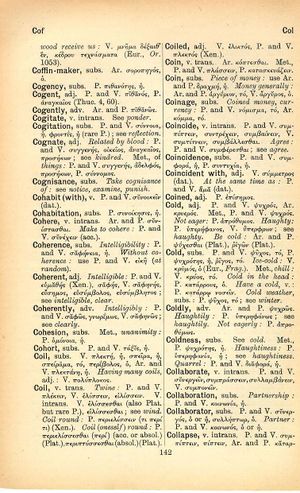cogitate: Difference between revisions
From LSJ
Ὁ γράμματ' εἰδὼς καὶ περισσὸν νοῦν ἔχει → Qui litteras didicere, mentis plus habent → Wer schreiben kann, hat auch bedeutenden Verstand
(6_3) |
(D_2) |
||
| Line 6: | Line 6: | ||
{{Lewis | {{Lewis | ||
|lshtext=<b>cōgĭtātē</b>: adv., v. [[cogito]]. | |lshtext=<b>cōgĭtātē</b>: adv., v. [[cogito]]. | ||
}} | |||
{{Gaffiot | |||
|gf=<b>cōgĭtātē</b>¹⁶ ([[cogitatus]]), avec réflexion : [[cogitate]] meditari Pl. Mil. 944, méditer mûrement ; [[aliquid]] [[cogitate]] scribere Cic. Arch. 18, écrire (rédiger) qqch. avec réflexion (après méditation). | |||
}} | }} | ||
Revision as of 06:43, 14 August 2017
English > Greek (Woodhouse)
v. intrans.
See ponder.
Latin > English (Lewis & Short)
cōgĭtātē: adv., v. cogito.
Latin > French (Gaffiot 2016)
cōgĭtātē¹⁶ (cogitatus), avec réflexion : cogitate meditari Pl. Mil. 944, méditer mûrement ; aliquid cogitate scribere Cic. Arch. 18, écrire (rédiger) qqch. avec réflexion (après méditation).

